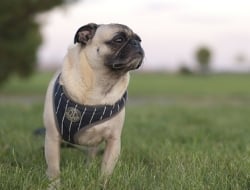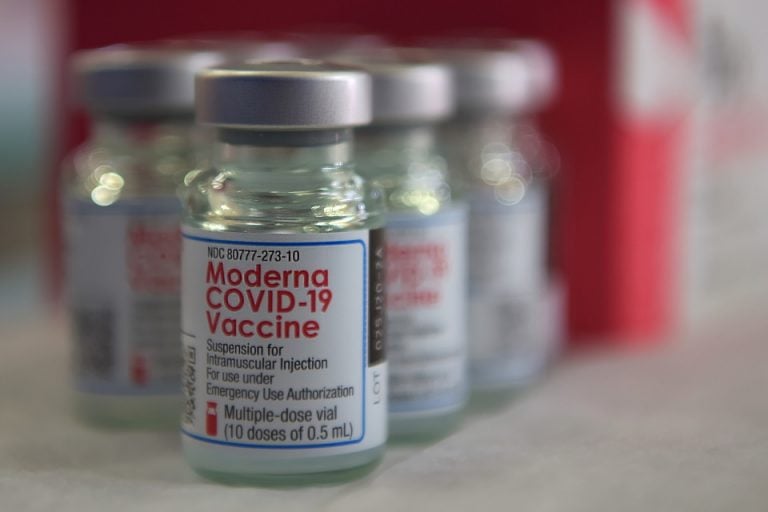Amish Dog Breeders Seek To Improve Standards, Reputation
Amish involvement in the dog breeding industry has gotten a lot of attention over the years, in particular due to several highly-publicized cases involving mistreated animals.
 The term “puppy mill” is often used to describe these businesses (and is sometimes extended to describe breeders in general).
The term “puppy mill” is often used to describe these businesses (and is sometimes extended to describe breeders in general).
Amish are aware of the negative perception. The Lafayette Journal & Courier reports that Amish breeders in the Daviess County, Indiana community are cooperating with Purdue University’s Center for Animal Welfare Science to improve breeding practices:
“It was time that we as breeders recognize that there are professionals out there that can help us and we need to involve them in our businesses,” said Levi Graber, a member of Odon’s Amish community who helps several breeders in the area.
Graber contacted Purdue a few years ago to seek input on how to better meet consumer expectations. Then and started working with Candace Croney, director of the animal welfare center. Croney and a team of researchers started a pilot program to review how breeders run their facilities and whether certain changes could improve the physical and behavioral health of their dogs.
What exactly are those changes?
Some facilities’ dogs were really loud and many became over-excited when they saw people, which Croney said indicated they weren’t used to seeing people often.
The research team advised those breeders to make sure something positive happens for the dog, such as receiving a treat, every time someone comes into the kennel area.
They also suggested letting the dogs out in the yard daily to exercise and socialize.
The small changes made a big impact, Croney said. Over four months, the dogs in the kennel with the most behavioral issues became calmer when they saw people, and they physically looked better.
“We’ve seen a very positive impact on some of the things she recommends,” Graber said. “I’ve seen more contented, happy dogs.”
The goal is to make this a national program of science-based best practices.
I learned from the article that there is not a lot of research on dog care related to high-volume breeding. Agricultural economist Nicole Olynk-Widmar notes that people associate larger-sized commercial breeders with more problems.
If dogs require human interaction to be healthy, this would be an understandable assumption to make. Amish have large families which means more potential interaction. But it simply takes more time and manpower to handle many dozens of dogs versus just a handful.
It will be interesting to see what conclusions the program reaches. There is a demand for pet dogs that will be filled by someone. If Amish plan to continue in the business, improving standards and their reputation will be a plus for everyone involved, dogs included.
Pug photo: Bobby Bradley/flickr





I think this is a great idea. I hope all dog breesers will start doing this.
High volume breeding
The Amish people are a godly and loving people but their dog breeding practices aren’t acceptable. It is contrary to all that they are. Dogs are living beings deserving of love and respect. They are NOT livestock.
Breeders in my area get as much as $18,000 dollars for a fully socialized and trained puppy with a pedigree. $3K or more for the dog alone. By properly exercising, feeding, training, and socializing them you can make much more money. Also be sure those that buy your puppies are prepared to properly take care of them.
It’s all about improving the breed not just profit though there is nothing wrong with making money. My Golden Retriever is the light of my life. I’m far more social with people since getting Micah. I thought those like me who thought of their dog a part of the family and not just a pet were crazy. I couldn’t have been more wrong.
On my bus tour to Shipshe last. September, one of our stops was at a large Amish bulk food grocery store. There was also a substantial “extension” outside where lots of colorful lawn furniture and other garden do-dads were out on display. There was a large shed-sized building there, also, which was marked as having dogs/puppies to sell. I didn’t go inside (I’d want to take them all home with me! I don’t think my lone cat would approve!) It was a hot day (90’s) and I just hoped the pups inside were well hydrated and not suffering from the unseasonal heat. Some other people on the tour went in and I heard them talking about wanting to take certain pups home (they didn’t, at least not on the bus).
I’m really glad the Amish are learning about socializing the dogs they breed, and otherwise improving their care. I am a “dog person” from way back, and I don’t like to see them abused or neglected. The improvements noted here can only help everyone—sellers, purchasers, and the dogs themselves.
Alice Mary
No longer puppies next to the bulk food sales in Shipshewanna
I just wanted Alice Mary to know that the place she mentioned no longer sells puppies. I was there a few times in 2019 (as late as October), and their bulldog sign advertising puppies is no more, and the shed has been removed. I didn’t ask anyone why they no longer offer dogs. The local advertiser, The People’s Exchange, still has many listings for dogs.
Amish breeders
Everything I have ever heard about Amisg dog breeders indicates they are cold blooded and barbaric in how they treat dogs. For this very reasin I REFUSE to buy anything from them.
Good News
As the adopter of a breeding mother Newfoundland dog from an Amish-owned dog breeder, I am very glad to learn about this program. Our dog is beginning to become “a real dog” with the help of medicine, a behaviorist, and our consistent patience and love. It was clear when we brought her home that she had been seriously deprived of both human interaction and any form of healthy stimulation – outdoors, grass, etc.
I am sure that there are many reputable breeders who are Amish, and look forward to more good news about those who wish to improve the quality of life for the dogs they breed.
Dog breeding
From what I’ve seen in the Michigan area Amish, animals are not at all considered as having needs. They are poorly treated and considering how badly treated they are, it’s a wonder those animals serve any purpose at all. I’ve seen families with “pet” dogs that run loose across buys roads, have badly matted fur, flea-infested, not loved, and allowed to breed over an over. When I would interact with a dog on one of the farms, the family would look at me as if I were crazy! One woman whom I considered a friend, had her dog tied up to a tree in the blazing sun in the middle of summer. He had no bowl of water and was barking non-stop for attention. I had to beg her to allow him inside, which she did. They don’t have their “pet” spayed/neutered so they breed and the puppies are then sold, to whomever will buy them. I so wished I could have bought every one of them. I will not do business with an Amish family that sells puppies/kittens or mistreats them. They want to be separate from the “Englishers” because they consider themselves to be of the true faith, and they don’t want to be corrupted by us, but they certainly know how to take advantage of us and much worse, they don’t take care of God’s creatures in a kind and humane way!
Janice, I am glad you clarified “in the Michigan area” and HOPE you will not class ALL Amish as alike in how animals are seen or treated. One of the most horrible dog abuse cases I have personally seen was done by a non-Amish guy but I know better to assume or believe that not ALL _________ church members of _____ background are guilty of what one does. In our area there were several animal hoarding cases maybe a year or two ago and those made the front page news in this county. It was weird to notice the appearance, lifestyle, economic level and grammar of the people involved was similar, but I can’t believe it means all people fitting that frame are animal hoarders.
I think it’s fair to say that the more conservative the group, the less likely they are to see animals as pets. This is 100% my own opinion but is based on experience and personal observation.
Anyone seeing how our two dogs are treated is more liable to think we spoil them, especially when fat and too-big-for-a-lap Biscuit burrows into my lap when I’m reading in my easy chair. Our dogs are not only fed, watered, allowed inside, treated for ailments & parasites, they are loved and appreciated. I like coming home and being greeted by our two tail-wagging & wiggly dogs and always spend some time patting them and fussing over them. (And our dogs are probably a bit spoiled… unless buying Christmas presents for dogs is considered normal.)
Dog breeding
You are correct’ there are terrible people in all walks of life, who do terrible things to all God’s creatures. A recent case in Mio, MI. again, of cruel dog breeding, by Amish, highlights how people who claim to be Christian, Godly, simple, Biblical, etc. also, pick and choose just how Christian, Godly, simple, and Biblical, etc. they will be. I expect anyone who claims to be a Christian, to be kind and compassionate towards anyone, or anything, that is vulnerable and dependent upon humans for their survival. It isn’t difficult to be that way…not if one is a true Christian, regardless of denomination.
A late follow up
We were in the Northern Indiana Amish communities for a week recently, arriving on Sunday June 26th and departing on Sunday July 3rd. We had the opportunity to visit several Amish farms and businesses, some as part of a tour organized by & associated with Horse Progress Days and some on our own. I looked at how the people that we visited treated their animals; cows, horses and especially dogs and can honestly say I did not see any animals that appeared to be mistreated, neglected or abused in any manner.
I did get to drive a wonderful team of Belgian geldings while visiting Low Valley Organic Dairy Farm; thank you owner/operator Andy Mast. His animals, including his red & white Holstein cows were easily as well cared for as any I have ever come across. I didn’t see any dogs on his place, but if they had any it is possible that he had them penned up as there were two busloads of English wondering about.
His fantastic mom took a group of interested ladies (including my bride of 38 years) on a tour of their house. No dogs in there either.
We were at Horse Progress Days all day on Friday July 1st at the MEC (Michiana Event Center) and most of the day Saturday, too. Late on Saturday afternoon my wife was organizing and cleaning up inside our trailer as she was preparing it for our 1,300 mile return trip home. She asked me to take Xena, our 7 year old Dachshund out for a walk so she would be out from underfoot.
There was one event left at HPD that I wanted to see, so I took Xena with me. She is a 11 pound mini Dachshund, and yes, she is very pampered. Once there, several little Amish children were drawn to her like iron filings to a magnet. Which is the same as with little Engilshers, too. Xena is an equal opportunity dog; she loves all little children.
As we were leaving, an Amish teenager,a girl of about 13 or 14 stopped me and asked to pet Xena. She said that her family raised and sold Dachshunds until about 3 years ago. Then she added; “but we had to get rid of them”. I asked her why, and she said (quite sadly); “Some of our people give a bad reputation to the rest of us by the way they care for their dogs”. I told her that I was sorry to hear that and she sort of shrugged, but as she turned to walk away I could see a tear in the corner of her eye. Over her shoulder she said; “I sure miss those little guys. Bye, Xena”.
Oldkat that is quite a story. Sad for that little girl, and in general. But makes the point well. The Amish are such a distinct community that the actions of some are easily associated with the whole by observers.
Thanks for sharing this. Xena sounds great. I am a fan of dachsunds.
I don’t know anyone who has a puppy mill, but we did buy a new dog this week to replace our faithful elderly terrier that was hit on the road. We had never seen her run out on the road before, but I guess it only takes once. She was, according to the driver of the car, chasing a rabbit which sounds typical, though none of us recall her ever actually catching one. Anyhow, some of us wanted a big dog, some of the family wanted another small dog. We ended up with a toy-poodle. (Though right now it looks more like the sponge-mitt we use for washing buggies.)
The Amish couple we bought our puppy from raises poodles and as a dog-person I was interested in seeing the parents and the set-up. I was impressed enough to be happy to buy from them, or happy with everything except the price, I should say.
So… a new puppy in the house means house-training all over again, dealing with middle-of-the-night puppy crying, and chewed carpets, but though we have only had this puppy two days, we are already attached to her. 🙂
Sorry to hear you lost your dog but glad you found a new one to become attached to…the sponge-mitt comparison made me smile 🙂 Always funny to think that these little poodles and chihuahuas are related to mighty beasts like mastiffs and great danes. I guess there’s a dog for every taste/habitat 🙂
Yes, there does seem to be a dog for every taste or habit. Friends of ours have a wonderful Great Dane and I was very interested in one — how’s THAT for contrast; from a tea-cup chihuahua and terrier to a Great Dane? Our friend’s dog is very well-mannered but protective, if that makes sense. We were warned, though, that Great Danes are prone to health issues and we know such a big dog could be intimidating to people. Though we live in a very thickly populated area, our home is very secluded & private, but still… we would not want visitors to feel afraid of a dog. No one could possibly be afraid of our little poodle puppy, though I have discovered she has VERY sharp teeth! She needs to learn that my bare toes are not sausages. 🙂
How to tell?
I am considering purchasing a puppy from an Amish breeder that I found through
Greenfield Puppies in PA. I am from ME so I can not just pop in to see conditions at the breeders facility. How can I find out about this prior to committing to purchasing a puppy and driving 10 hours each direction to pick her up?
Too little too late for many dogs
This is a bandaid on a huge sore. This is JUST about reputation – they want to keep selling dogs. Amish believe animals are only livestock. That legal definition means the breeder doesn’t have to maintain the same standards as would a place for domesticated animals.
Shame on the puppy mills. IF God gave us dominion over the animals, as you believe, then the mills are failing and Amish are doing a horrible job.
Some mills are not using “brokers” to see their dogs so it doesn’t look like a puppy mill situation. THAT IS LYING – God doesn’t approve of liars.
BE careful if you decide to get a dog, many liars and decpetive practices.